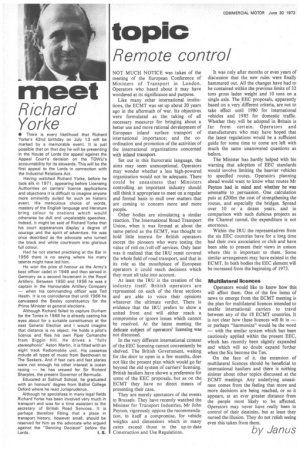topic
Page 46

If you've noticed an error in this article please click here to report it so we can fix it.
Remote control
NOT MUCH NOTICE was taken of the meeting of the European Conference of Ministers of TranSport in London. Operators who heard about it may have wondered at its significance and purpose.
Like many other international institutions, the ECMT was set up about 20 years ago in the aftermath of war. Its objectives were formulated as the taking of all necessary measures for bringing about a better use and more rational development of European inland surface transport of international importance; and the coordination and promotion of the activities of the international organizations concerned with inland transport.
Set out in this Eurocratic language, the aims may seem unexceptional. Operators may wonder whether a less high-powered organization would not be adequate. There could be uneasiness that Ministers controlling an important industry should still think it appropriate to meet on a regular and formal basis to mull over matters that are coming to concern more and more people.
Other bodies are stimulating a similar reaction. The International Road Transport Union, when it was formed at about the same period as the ECMT, was thought to hold little interest for British operators except the pioneers who were testing the value of roll-on /roll-off services. Only later was it realized that the IRU remit covered the whole field of road transport, and that in its role as the mouthpiece of European operators it could reach decisions which they must all take into account.
At least the IRU is the creation of the industry itself. British operators are represented on each of the three sections and are able to voice their opinions whatever the ultimate verdict. There is evidence that the IRU prefers to show a united front and will either reach a compromise or ignore issues which cannot be resolved. At the latest meeting the delicate subject of operators' licensing was not discussed.
In the very different international context of the EEC licensing cannot conveniently be shelved. The British Government, waiting for the door to open in a few months, does not like the present plan which would go far beyond the old system of carriers' licensing. British hauliers have shown a preference for some of the EEC proposals, but as on the ECMT they have no direct means of presenting their case.
They are merely spectators of the events in Brussels. They have recently watched the Minister for Transport Industries, Mr John Peyton, vigorously oppose the recommendation, in itself a compromise, for vehicle weights and dimensions which in many cases exceed those in the up-to-date Construction and Use Regulations. It was only after months or even years of discussion that the new rules were finally hammered out. All the changes have had to be contained within the previous limits of 32 tons gross laden weight and 10 tons on a single axle. The EEC proposals, apparently based on a very different criteria, are not to take effect until 1980 for international vehicles and 1985 for domestic traffic. Whether they will be adopted in Britain is far from certain. Operators and manufacturers who may have hoped that the latest regulations would be a sufficient guide for some time to come are left with much the same unanswered questions as before.
The Minister has hardly helped with his warning that adoption of EEC standards would involve limiting the heavier vehicles to specified routes. Operators planning ahead would want to know what routes Mr Peyton had in mind and whether he was amenable to persuasion.. One calculation puts at £200m the cost of strengthening the routes, and especially the bridges. Spread over 10 or a dozen years, and in comparison with such dubious projects as the Channel tunnel, the expenditure is not enormous.
Within the IRU the representatives from the six EEC countries have for a long time had their own association or club and have been able to present their views in unison where this is important to them. Some similar arrangement may have existed in the ECMT. In both bodies the EEC element will be increased from the beginning of 1973.
Multilateral licences
Operators would like to know how this will affect them. One of the few items of news to emerge from the ECMT meeting is the plan for multilateral licences intended to enable international carriers to travel between any of the 18 ECMT countries. It is not clear how these licences will fit in — or perhaps "harmonize" would be the word — with the similar system which has been cautiously applied within the present EEC, which has recently been slightly expanded and which will no doubt expand further when the Six become the Ten.
On the face of it. the extension of multilateral licences should be beneficial to international hauliers and there is nothing sinister about other topics discussed at the ECMT meetings. Any underlying uneasiness comes from the feeling that more and more decisions are being reached, or so it appears, at an ever greater distance from the people most likely to be affected. Operators may never have really been in control of their destinies, but at least they nursed the illusion. They do not relish seeing even this taken from them.
by Janus




























































































